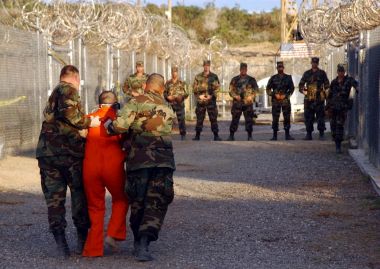CIA torture: What should the Christian response be?

Reactions have been predictable. The US senate intelligence committee report on the CIA's torture and abuse of prisoners has produced disgust and shame, anger and recrimination, defiance and doubtless a little gloating. Russia's foreign ministry called it "confirmation of gross, systemic human rights abuses" and the Afghan president said the programme "violated all accepted norms of human rights in the world." And who could argue?
I've met survivors of torture from many countries over the past 40 years, and read countless reports and studies. I've long known of the inhumanity of Guantanamo and the assorted network of secret detention centres. But the sheer volume of detail in this report still made me feel physically sick. (Which is nothing, of course, alongside the gross physical and psychological suffering endured by the victims of this regime.)
A response of indignation is perfectly valid. It is, however, the easy bit. There are huge questions to be addressed, not least whether torture can ever be justified.
Post-9/11, many have insisted that the world is now more dangerous than ever (a highly contentious proposition when not long ago two superpowers were aiming nuclear weapons at one another in a policy of mutually assured destruction). Nevertheless, there is great pressure on politicians, police, military and security services. An unforgiving media will always ask after some atrocity: Why did this happen on your watch? Why didn't you know?
Absolute prohibition of torture, it is said, equals self-indulgence, a refusal to confront the real world: everything is relative, we must do whatever is expedient. Harvard law professor Alan Dershowitz argues for the introduction of torture warrants. We know that torture happens, he says: we reduce it by regulating it, by insisting that an interrogator apply to a judge before being allowed to inflict torture – nothing too serious, he insists, just something like needles beneath fingernails.
Even after the horrors revealed in the senate report, the issue for some commentators remains not, 'is torture right?'; but, 'does it work?' Clearly it can gain information (often rubbish), instil fear, terrorise and feed hatred. But familiar arguments for its total prohibition remain valid. Here are a few:
- Torture is forbidden in international law. The United Nations and Geneva Conventions and many other agreements between nations declare it always inadmissible, even at time of war or acute national emergency. There is constant need to remind governments (including our own) of what they've signed up to.
- Torture breaches the rule of law within individual countries. And those on the receiving end (like the men at Guantanamo) have usually not been convicted of any crime. Law is meant to protect the most vulnerable.
- Almost all torture involves no 'ticking bomb', which might claim many lives. Once legitimised for special cases, it may be regarded as justified in many more. Where is the line to be drawn? If a suspect will not speak, is there not then a logical obligation to torture his associates – wife, parents or young children, even – if it might save lives? How many victims would be too many?
- Torture does immense psychological harm and often maims for life; its use implies that terrorists have won, by seducing us into adopting their valuation of human life.
An Amnesty International report in 1984 concluded: "Torture can be stopped. The international framework for its abolition exists, as do the investigative methods to verify and expose it. What is lacking is the political will of governments to stop torturing people. It is as simple and as difficult as that."
That remains as true today, for people of all faiths and none. But Christians, I would contend, have a particular obligation to be committed to this struggle, holding that each person bears the divine image and is the object of God's love in Christ: what we do to the most vulnerable human being, we do to him.
The Guantanamo abuse was carried out in an avowedly Christian country in an alleged attempt to defend Christian values. Maybe some of the torturers were faithful in church: the President who permitted the abuse certainly was. The shameful, scandalous contradictions in all this seem to have passed most believers by – as they have in the UK, complicit in so much abuse for generations, and less truthful about it.
By no means all church leaders here accept that torture is always wrong. When one spoke at a public meeting of being relaxed about imposing "a certain amount of measured discomfort", as a lesser evil, I asked if that included pulling out finger nails; he declined to respond.
I wondered what another acquaintance would make of that. A survivor of the CIA secret gulag, he has reported the comment of a guard he described as a Southern Baptist: "I convince myself each day that you guys are all subhuman – agents of the devil – so that I can do my job. Otherwise I'd have to treat you like humans..."
Following a Lord who was tortured to death, Christians have a key role to play in seeking a world without torture, campaigning for individual prisoners, supporting those who have survived, working where necessary to embarrass and shame governments if it helps create a climate where the unthinkable becomes unthinkable again. And since all abuse is a spiritual issue, we are to pray – both for those damaged by torture, and for those who order it, condone it, or remain wilfully blind to its use.
Roy Jenkins is a broadcaster and Baptist minister based in Cardiff.











